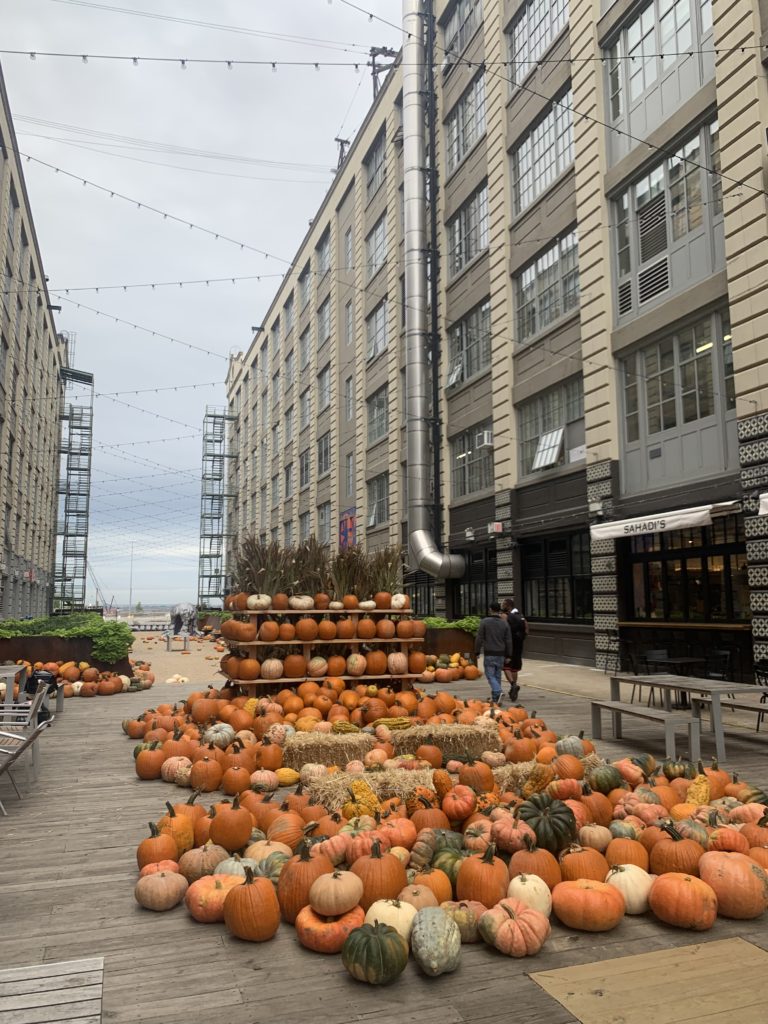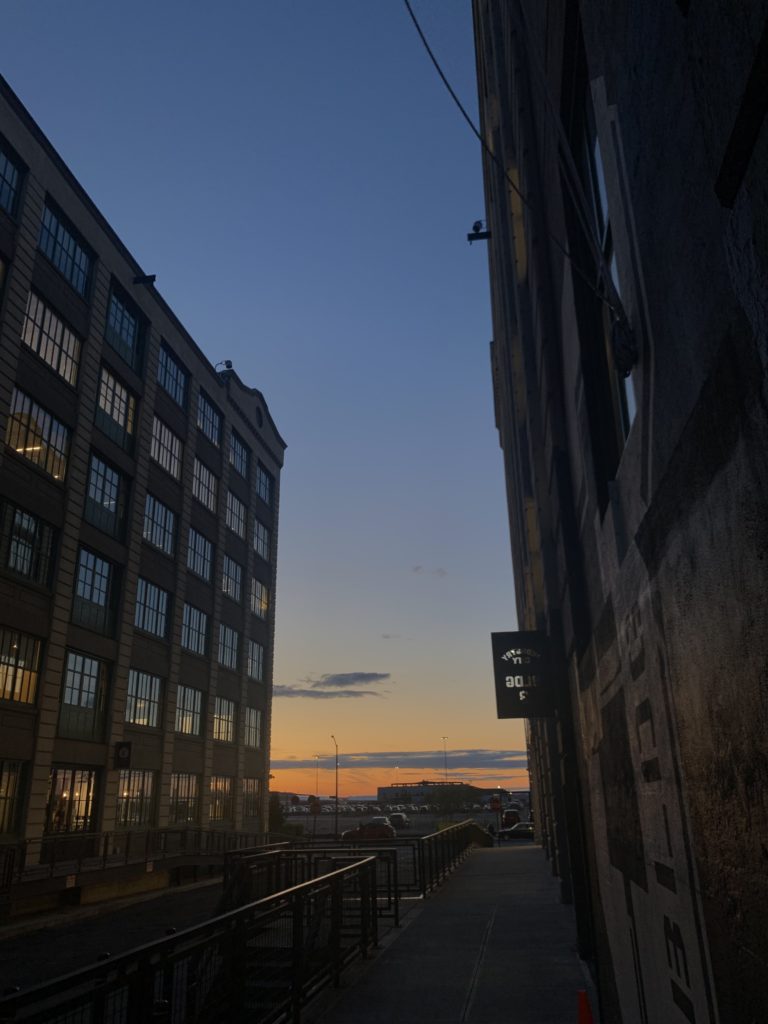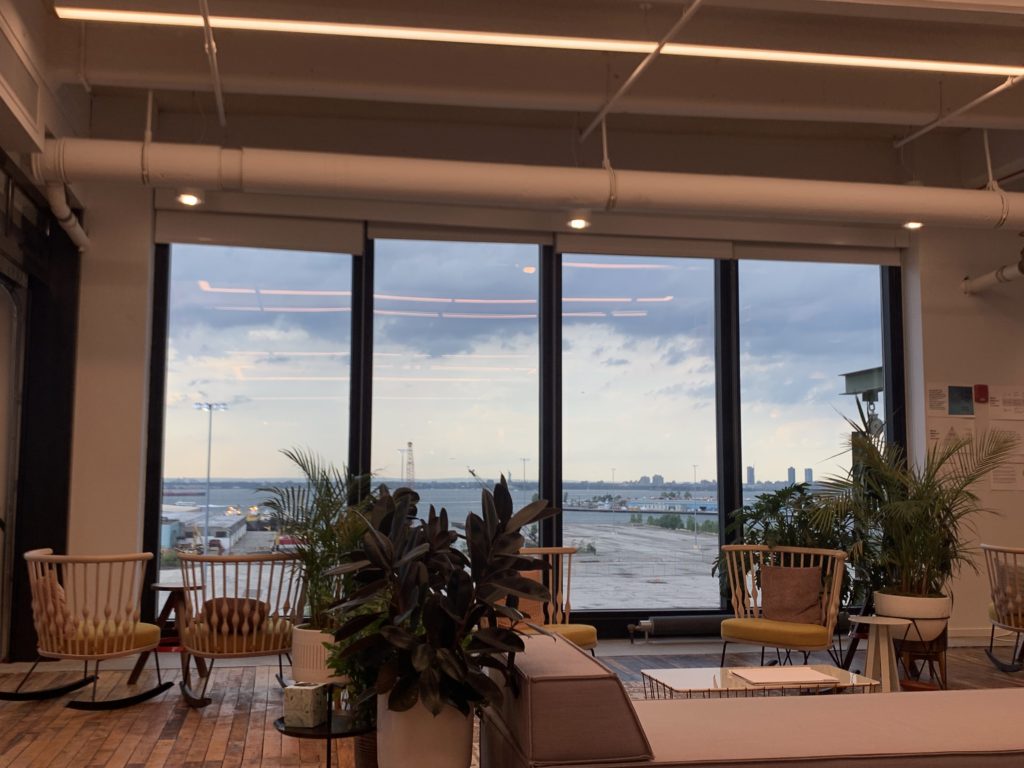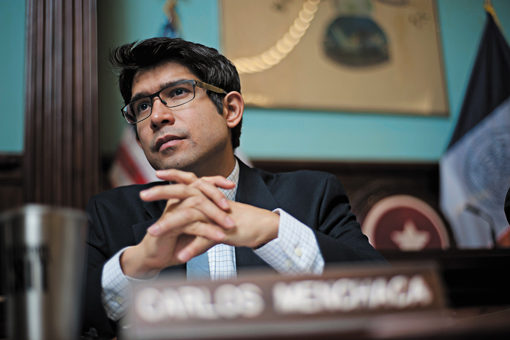As Councilman Carlos Menchaca was due to announce his decision on the future of Industry City, chants of “Sunset Park is not for sale” spread across the auditorium of PS 24. Unable to finish his speech, Menchaca abruptly left.
Security switched off the lights to try to disperse the crowds. But in the darkness, the angry residents used their phones to illuminate the room. Some even took over the stage, sharing fears that the proposed expansion of Industry City would soon change everything.
On the Brooklyn waterfront, as in the rest of New York, discussions about rezoning often do not end well.
Here, an expansion proposal by Industry City, a luxury retail and office space erected by the developers behind Manhattan’s high-end gourmet hangout Chelsea Market, has divided the community.
Some residents welcome the investment in the area, hoping for a safer neighborhood with more opportunities for the future. Others fear an expansion of Industry City will deepen the community’s woes, causing rents to further rise, and compounding ecological damages.
Councilman Menchaca, who will effectively be the final decider on the issue of rezoning, finds himself at the heart of the debate, “I’m trying to fight for my community and what they need, I’m trying to get the best thing possible for the neighborhood,” he said.
In the early 20th Century, Industry City was known as Bush Terminal, a manufacturing hub, and prominent fixture of the Sunset Park Waterfront. After World War II, as manufacturing declined nationwide, the Bush Terminal was abandoned, soon becoming a dangerous part of town.
In 2013, Jamestown and Belvedere Capital, the developers behind Chelsea Market, bought part of Bush Terminal. Since then, the developers have renovated the series of buildings that would become Industry City and turned it into a retail and office space with a high-end food court.
Tensions rose in March 2015 when Industry City executives proposed a change from their current zoning, typically referring to heavy manufacturing, to the middle-ground between heavy and light manufacturing. The company argued that this rezoning would allow them to create an “Innovation District,” including more retail space, luxury hotels, and manufacturing space.
On October 28th, 2019, Industry City amped up the pressure by sending their rezoning proposal to the City Planning Commission. This ignored the Councilman’s demand for a delay in order to agree on a Community Binding Agreement, which would include the residents in the conversation and hold Industry City accountable. The final vote will eventually be made by the City Council.
Industry City’s CEO, Andrew Kimball, did not respond to a request for comment.
This rezoning is critical for Industry City. The company invested $400 million in the renovation and development of its waterfront campus, according to a recent letter from it’s CEO to the Councilman.
But many of it is still underutilized. Andrew Kimball, its CEO, said in a 2016 presentation to the Connecticut Brownfield Conference, focussed on the repurposing of previously abandoned space; that the property was left 27% vacant, with 28% dedicated to storage, 2% to retail and 43% to the “innovation economy.”
Without the rezoning, Industry City estimates that it would take them 25 to 30 years to “fully invest the portfolio,” or make all the space available for retail, offices and manufacturing, according to the 2016 presentation obtained by John Santore, and posted on his community blog Sunset Park Reports.
But nearly four years later, this rezoning request is still unanswered. Divided by pressure from his constituents, Councilman Menchaca has delayed his decision on this controversial topic.
“Even if I say no,” Menchaca said, “Industry City isn’t going away.”

The courtyard, center of IC | Photo courtesy of Tabor Furr 
Outside IC on 36th street | Photo courtesy of Tabor Furr
Some residents of Sunset Park feel excluded from the new waterfront area, where Industry City houses a new Avocaderia and a recently closed coffee shop called Extraction Lab. There, a cup of coffee used to cost up to $18; for most of the neighborhood’s residents, who are working class immigrants, this was exorbitant.
The NYU Furman Center estimates that Sunset Park’s population in 2017 was 39.9% Hispanic, 32.7% Asian, 22.7% white and 2.4% black. But Industry City’s arrival in the neighborhood led to rising rents and is gradually reducing the presence of minorities in the neighborhood. Rezoning, some residents fear, will only exacerbate this.
Gendaris Tavera, 27, a Sunset Park resident of 11 years and originally from the Dominican Republic, recently moved to the Bronx. This happened after the phone accessories company she used to work at was relocated to New Jersey following the arrival of Industry City, known to locals as IC.
“I cannot say that IC is the devil because not everything is bad about it,” she said. “I am saying that what they are trying to do now with the rezoning is not going to benefit us at all.”
Tavera told the story of her friend, a mother of two, who had to move back to Mexico after her landlord raised the rent for her apartment. “Our people are being forced to move out of their places,” she added.
Professor Aaron Passell, Associate Director of Urban Studies at Barnard College, explains that communities are often at risk when developers come to their neighborhood. “The thing that we haven’t figured out about neighborhood change is how to keep people in place and make sure that they benefit from the way that the neighborhood gets,” he said.
One solution, resident Johanna Bjorken said at the latest public hearing, it to simply say no. While this “may not be able to solve the housing crisis,” she said, “opposing a rezoning is an opportunity to say no to a trend where only developers are getting rich.”
While a consequence of Industry City is exclusion and displacement, its early promise was of job creation.
In their 2016 presentation, the company pledged to create 20,000 jobs by 2025. This promise led to the Innovation Lab, a job training and placement initiative, and a partnership between Industry City and Opportunities For A Better Tomorrow, a local non-profit. Industry City provided the space, rent-free, and the non-profit works to find jobs for members of the community with funds from the Council as well as private ones.
Almost every year, Industry City provides an update to the residents of Sunset Park in the number of jobs it claims to have created. In 2013, its first year, that number was 1,900. The number of jobs rose to 4,100 in 2015, and to 6,500 in 2017. This year, Industry City reported that the total number of jobs created to-date was 7,500, with Sunset Park residents accounting for one-fifth of the employees.
But even this isn’t without controversy, as Councilman Menchaca and residents worry that those jobs numbers have never been independently verified. “I don’t want to have to trust IC to tell me how much is happening in there. I want to actually go there and do the job count,” said the Councilman.
The Councilman is trying to introduce legislation that would require Industry City to be evaluated by an external agency, such as the NY Economic Development Corporation. Menchaca said the non-profit, run by the City government, has evaluated other rezoning projects in East Harlem and East New York.
The inequity in the jobs that do get created worries residents. Tavera feels that Industry City is not creating jobs for her Latino community because most do not have documents, or do not speak English. Jei Fong, a local community organizer, said at a recent rally outside the Councilman’s office: “We will not accept this development so that we can clean hotel rooms for the rich,” explaining that the jobs that are created for Sunset Park residents tend to not be high-skilled.
Passell sees this as a common phenomenon, and notes that developments like Industry City “are created to house high-end professional service jobs, and those people come not from the neighborhood to do that work there. To the degree that jobs for local neighborhood residents are created, those jobs are low-end service jobs.”
In addition to uncertainties around how Industry City does its job count, there are questions around how they categorize the jobs created. A big selling point for Industry City has been that they are creating manufacturing jobs, which in Sunset Park, a community that is still mourning the end of the manufacturing era, is enticing.
But what Industry City is considering as manufacturing does not fit the traditional definition from the Department of Labor Statistics “often described as plants, factories, or mills and characteristically use power-driven machines and materials-handling equipment.”
A June 2019 study by the Center for an Urban Future, and co-sponsored by Industry City, gave an example of manufacturing at Industry City with Keap Candles, “a nearly zero-waste, direct-to-consumer scented candle company.”
Reflecting upon what Industry City has done for jobs in Sunset Park in the last half decade, Councilman Menchaca said, “It’s mixed, I want more.”
In a March 2019 letter to the Councilman he said that “we have initiated unprecedented engagement, transparency, consultation, and local workforce development initiative.” But the Councilman emphasizes that local residents took the lead in creating a dialogue, not Industry City.
Residents also feel like Industry City’s approach to communication with the community has been one-sided. They are overwhelmed by the extensive use of publicity on Facebook, Twitter, flyers, subway ads, and even door knocking but feel like the conversation is lacking the transparency to address the real issues. “They are treating it like a political campaign,” says Betty Yu, a local artist who document the issue of displacement in Sunset Park.

But not everyone in the community is opposed to Industry City. In a letter to Councilman Menchaca in March 2019, published on Sunset Park Reports, Kimball attached a statement of support for IC’s rezoning plan signed by 72 local business.
And at the last public hearing, many residents expressed that the neighborhood has become safer as a direct result of IC’s arrival to the waterfront. “Nobody went to the waterfront,” said George Cardona, a local tax accountant, citing that those who did were looking for drugs or sex workers.
Some business tenants at Industry City also try to connect directly with Sunset Park residents. Joe Landolina, CEO of Cresilon, a biotech startup, says he has already created “real manufacturing jobs” at Industry City, and wants to continue to do so. Tabor Furr, Foundation Inventor at What If Innovations, a creative consultancy company, is looking at a project to teach design thinking in local schools.
Other tenants simply want a resolution. Chris Taylor, the owner of LiLac Chocolates at Industry City, shared his frustration with the lack of clarity around the future of IC, which is preventing him from making long-term business decisions. “Everyone needs to stop screaming at each other,” he said.
Councilman Menchaca is leveraging his power over the rezoning decision to mitigate the consequences of Industry City’s presence in the neighborhood, while trying to create the best possible deal for his constituents and the future of the neighborhood.
Marie Rocco, Assistant Professor of Urban Studies at Barnard College explains that “the Councilmember representing the district -here Menchaca- is incredibly powerful in a rezoning effort.” She says that the rest of Councilmembers almost always defer to the Councilmember representing the district under review. The Mayor also has the power to veto the Council’s decision, but this rarely happens, Rocco added.
Menchaca flatly rejected the initial version of the proposal, calling it a “non-starter” in a September 2019 letter to the CEO of Industry City.
After the Councilman’s negotiations, the updated rezoning proposal now includes a promise to create a technical high school, for both young residents and adults, to provide them with training and jobs. The Councilman also asked for the removal of hotels from the proposal, less retail space and more manufacturing. IC agreed to all these demands.
The issue also rose to the attention of state and federal lawmakers. Congressman Jerry Nadler, Congresswoman Nydia Velázquez, and State Senator Zellnor Myrie sent a joint letter to Councilman Menchaca expressing their deep concern: “this rezoning could exacerbate real estate pressures, displacement, rising rents, congestion, pollution, and forever shift the nature of the waterfront away from manufacturing to commercial tourism.”
Under pressure from Industry City and his constituents, and scrutiny from state lawmakers, the Councilman still isn’t ready to make a decision. “I’m not going to be rushed by them [IC] or the community to say yes or no,” he said.


Leave a Reply